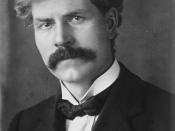The depression of 1929 to 1935 was a particularly severe one, resulting primarily from the Wall Street Crash, however there were many other contributory factors. During this period two governments came in to power. The Labour government 1929-3, led by Ramsey Macdonald and the national government 1931-5, which consisted of Conservative and Liberals led by Macdonald, in a coalition. The policies adopted by the parties were very different despite having the same leader. A Laissez Faire policy was pursued by Labour up until the end of their office, whilst the National Government abandoned this policy in favour for policies of more direct action, to deal with the now record level of 2.5 million unemployed.
During it's term in power Labour employed various policies in order to stabilise the economy, which had been ravaged by the depression. Many of the policies were pursued with the right intention but proved to be of no particular use.
One example of this being 'Balancing the Budget'. The Labour government believed that if the economy was left alone, in accordance with Laissez Faire, it would eventually stabilise itself as long as expenditure was the same as the income, allowing equilibrium. Although this was one of the safest approaches the government could adopt it did little to tackle the major problem created by the depression, unemployment. Similarly a 'Policy of Drift' was applied when the budget became unbalanced but this inevitably did nothing to counteract the effects of high unemployment and low tax revenue. Despite Macdonald's optimism this equilibrium was never achievable. The amount of taxes used as unemployment benefit unbalanced the government further and created no long-term solution. This became apparent to Macdonald in 1930 when he raised the expenditure on public work schemes from Februarys ã70 million to Septembers ã140 million. Although this offered...


